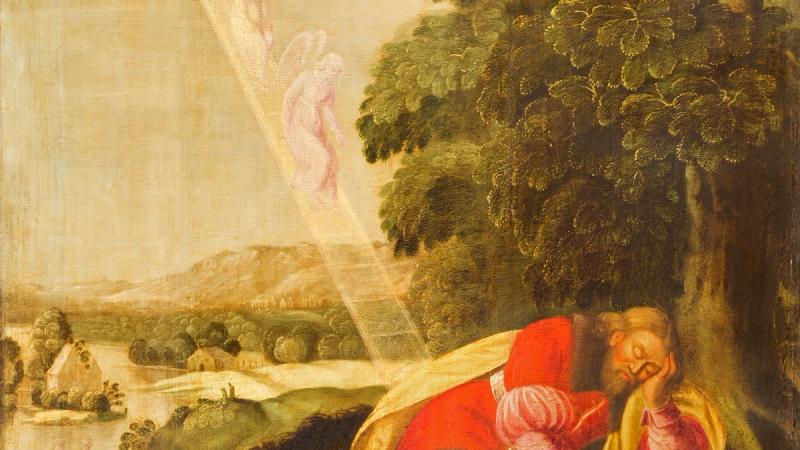We’re steeped in a cultural soup of ascent. From religious life framed as the journey upwards, to transcending human limitations through technology, or climbing the corporate ladder, the mentality of ascent is ubiquitous. Career advancement. Personal achievement. The moral arc of history. And so it goes. But as the incarnation of our Lord in the womb of Mary and his nativity in a feeding trough in Bethlehem remind us this Christmas, spirituality is ultimately a matter of descent—the descent of God to humanity and the bringing down of human will and pride before the God who condescends.
The Mindset of Ascent in Society
Religious life and spiritual experiences are frequently understood as feats of ascent. Through meditation the Buddha became the “Awakened One,” transcending Karma and escaping the cycle of rebirth. Gnostics aspire to revelatory spiritual knowledge that “releases the divine spark from its lowly prison…of the physical world.” Many religious systems and spiritual practices are framed in a similar way—the journey upward towards the Divine, towards Mind, towards Being. Sometimes Christianity too, has used this language. We see it subtly in the language of victorious living or improving your walk with God, and not-so-subtly in monastic traditions like Guigo II’s The Ladder of Monks and St. John Climacus’ The Ladder of Divine Ascent.
Another vivid example of the ascent mindset is found in the world of Big Tech, where Silicon Valley prophets proclaim a coming age of transhumanism and singularity. To put it simply, this vision seeks “the acceleration of the evolution of intelligent life beyond its currently human form and human limitations by means of science and technology.” Well-known futurist and artificial intelligence expert Ray Kurzweil calls this “the union of human and machine.” It doesn’t take much to notice the religious and eschatological dimensions of this future vision, complete with creeds, a savior, and the promise of immortality—all cloaked in the Darwinian assumptions of evolutionary progress. Uber, for one, emblazons their confession across their website: “We believe in the power of technology.” Likewise, in creedal fashion, transhumanists have formulated a declaration of their beliefs in the same way that churches do, documenting their hope of transcending human limitations.
It is undeniable that technology has progressed, which makes it easy to buy into the related progress narratives. In Technopoly, Neil Postman, one of the 20th century’s most astute critics of technology, unpacked how “technologies create the ways in which people perceive reality,” and come to define the ways in which people understand their world and their work (21). Postman perceived how technological progress contributed to utilitarian understandings of labor and education, eviscerating the deeper meaning inherent in these tasks. In the career world, workers are on the march, ascending the mount of corporate profits and personal wealth—as if they are cogs in the machine, seeking promotion, climbing the corporate ladder, fulfilling the American dream. In the educational realm, students are placed on the upward spiral of credentialing—as if they are hard-drives updated with daily data-dumps, commodified for the 21st century economy.
Perhaps the ascent mindset pervades society so extensively because it comes so naturally and resonates so deeply with our experience of daily life. Do this, get that. Want more, do more. And so it goes. The opinio legis runs deep within our nature. As Lutheran theologian John Mueller penned in his 1934 Christian Dogmatics, the opinio legis is “the common denominator of all religions outside of Christianity; the erroneous opinion that a man must save himself by good deeds” (9). Mueller further explains, the “natural man, knowing nothing at all of the true God and His glorious salvation through faith in Christ, is compelled to hold the opinio legis, or salvation by good works, to be the supreme religious precept” (97). The desire to ascend Godward—however disordered its expression—is a residue of some primordial hope, which Scripture reveals is accomplished paradoxically not through human ascent, but by Divine descent.
The Motif of Descent in Scripture
An alternative to the opinio legis and the ascent mindset is found in the Scriptural motif of descent. While themes of ascent are certainly present throughout Scripture, the dynamic of descent plays a surprisingly prominent role throughout redemptive history.
The Old Testament is replete with imagery of descent, or coming down. Consider the juxtaposition of the Tower of Babel as man’s attempt at ascent, building “a tower with its top in the heavens” (Gen 11:4) with God’s descent in the account of Jacob’s Ladder. Upon first glance this too may appear as an ascent passage, offering Jacob an upward path to the Divine. But closer analysis reveals that it is Yahweh who descends the staircase and stands over Jacob, pronouncing blessing upon him and his descendants. Jacob’s then responds “Surely the Lord is in this place, and I did not know it” (Gen 28:16). Jacob did not penetrate the heavenly realm through meditation or moralism; God descended to his place, his realm, his world.
The motif of descent can be traced further, with Joseph’s descent into the pit at the hands of this brothers (Gen 37), his descent into slavery in Egypt, and even into prison at the hands of Potiphar (Gen 39). Generations later, God mightily descends to deliver his people from the hands of the Egyptians in the Exodus. The life of Israel in the wilderness, in the Promised Land, and in exile is marked with God’s periodic intrusions and the accompanying refrain “the Lord came down.”
Another notable Old Testament descent is found in the account of Jonah. Upon receiving God’s call to preach to Nineveh, Jonah refuses and flees “from the presence of the Lord” (Jon 1:3). Thus begins his descent, down to Joppa, down into the belly of the ship, where he laid down. To calm the storm, then came his further descent, down into the sea and down into the belly of the great fish (Jon 1:3-17).
The New Testament continues this theme, as the descent motif climaxes in the ultimate descent of God to earth in the incarnation of the Son. Old Testament types like Jacob and Jonah are fulfilled in Christ, who makes explicit references to these two figures. Jesus draws on the imagery of Jacob’s Ladder when he tells his newly called disciples, “you will see heaven opened, and the angels of God ascending and descending on the Son of Man” (Jn 1:51). Christ is the staircase, the gate of heaven, granting access to the Father. So too, Christ is the greater Jonah, “For just as Jonah was three days and three nights in the belly of the great fish, so will the Son of Man be three days and three nights in the heart of the earth” (Matt 12:40).
Christ’s descent definitively accomplishes the long sought-after ascent. For it is only Christ, who “by the power of an indestructible life” (Heb 9:16), cannot be held by death, earning the right to ascend and share the spoils of victory with His own. Paul picks up on this in Ephesians 4, when he quotes Psalm 68:18 and explains, “Therefore it says, ‘When he ascended on high he led a host of captives, and he gave gifts to men.’ (In saying, ‘He ascended,’ what does it mean but that he had also descended into the lower regions, the earth? He who descended is the one who also ascended far above all the heavens, that he might fill all things.)” (Eph 4:8-10).
Via the pathway of descent, suffering, and death Christ achieved victory and shares it with his body, the Church. Paul continues, “And he gave the apostles, the prophets, the evangelists, the shepherdsand teachers,to equip the saints for the work of ministry, for building up the body of Christ, until we all attain to the unity of the faith and of the knowledge of the Son of God, to mature manhood,to the measure of the stature of the fullness of Christ” (Eph 4:11-13).
The Paradox of Divine Descent
The motif of descent reveals one of the many paradoxical ways that God works in the world to redeem humankind. This is the way of the cross, as Christ comes “not to be served, but to serve” (Matt 20:28). This runs counter to our fallen nature, and the overwhelming cultural experience of ascent, progress and advancement. Of course, the clash between the way of the cross and the way of glory is nothing new; it finds its roots in that primal and Edenic temptation, “you will be like God” (Gen. 3:5). However, contrary to the teaching of most religions and our daily experience, being “like God” is not found in aspirations of ascent. It is found in being brought low before God as “the tax collector standing far off, would not even lift up his eyes to heaven, but beat his breast, saying, ‘God, be merciful to me, a sinner!’” (Lk 18:13). It is from here that Christ says, “Friend, move up higher” (Lk 14:10), as we are blessed “in Christ with every spiritual blessing in the heavenly places” (Eph 1:3). It is in this way that we are united to Christ, conformed to his image (Rom 8:29) and made partakers of the Divine nature (2 Pet 1:4)—made like God in the proper sense.
Paul references this glorious Gospel paradox, when he writes: “For since, in the wisdom of God, the world did not know God through wisdom, it pleased God through the folly of what we preachto save those who believe. For Jews demand signs and Greeks seek wisdom, but we preach Christ crucified, a stumbling block to Jews and folly to Gentiles, but to those who are called, both Jews and Greeks, Christ the power of God and the wisdom of God. For the foolishness of God is wiser than men, and the weakness of God is stronger than men” (1 Cor 1:21-25).
I am reminded of the great paradox of Divine descent each Sunday, as the congregation I am a part of gathers for Divine Service to receive from Christ his Word and Gifts. Prior to the Eucharist, we confess the faith together using the Nicene Creed. As the congregation reaches the phrase, “who for us men and for our salvation, came down from heaven,” some heads lower, some bodies bow, some knees descend in genuflection, as our bodies are brought low in humility and gratitude before the great condescension of God into human flesh. This is especially poignant as we gather on Christmas Day and receive his body and blood in celebration of the Feast of the Nativity of our Lord. It is on this day we pray together:
Word made flesh, we give You thanks that of Your mercy and compassion, You become incarnate and have redeemed us from sin and everlasting death. Enlighten our hearts by Your Holy Spirit, that we may ever be thankful for such grace and comfort ourselves by it in all tribulation and temptation and at last obtain eternal salvation; who with the Father and the Holy Spirit are one Lord, one God, now and forever. Amen.
Joshua Pauling teaches high school history, was educated at Messiah College, Reformed Theological Seminary, and Winthrop University. In addition to Modern Reformation, Josh has written for Front Porch Republic, Mere Orthodoxy, Public Discourse, Salvo Magazine, and The Imaginative Conservative. He is also head elder at All Saints Lutheran Church (LCMS) in Charlotte, North Carolina.



